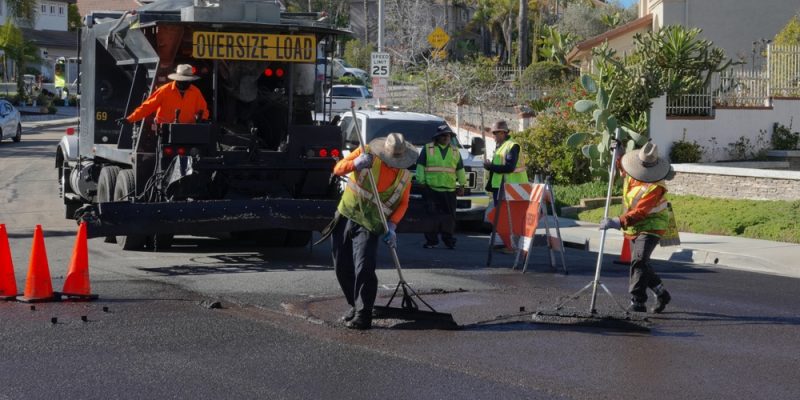
Spring, Summer, or Fall? Choosing the Best Time for Asphalt Paving
When it comes to asphalt paving, timing is crucial for achieving the best results and longevity of the pavement. Each season—Spring, Summer, and Fall—offers unique advantages and challenges for paving projects. Factors such as temperature, precipitation, and humidity play significant roles in determining the optimal time for asphalt paving. Let’s delve into each season to understand the pros and cons of paving during Spring, Summer, and Fall.
Spring: Embracing Renewal and Mild Conditions
Spring is often considered a favorable time for asphalt paving due to its mild temperatures and rejuvenating environment. As the weather warms up and vegetation starts to bloom, it signals the perfect time to embark on outdoor projects, including paving.
Advantages of Spring Paving
- Moderate Temperatures: Spring temperatures are typically moderate, ranging from cool mornings to pleasantly warm afternoons. This temperature range allows for ideal conditions for asphalt to be applied and compacted effectively.
- Reduced Risk of High Temperatures: Unlike Summer, where scorching temperatures can affect asphalt workability and compaction, Spring offers a more forgiving climate.
- Optimal Conditions for Asphalt Curing: The moderate temperatures in Spring facilitate proper curing of the asphalt, ensuring that it sets and hardens correctly.
Challenges of Spring Paving
- Variable Weather: Spring can be unpredictable with occasional rain showers and fluctuating temperatures. Sudden rainfall can delay paving projects and affect the quality of the asphalt surface.
- Preparation for Rainy Days: Contractors must be prepared to cover or protect freshly laid asphalt from rain, which could compromise its integrity if exposed too early.
Summer: Embracing Heat and Longer Days
Summer is synonymous with warmth and extended daylight hours, making it a popular choice for asphalt paving projects, especially in regions with short Spring and Fall seasons.
Advantages of Summer Paving
- High Temperature Consistency: Summer provides consistent high temperatures, which are ideal for asphalt compaction and bonding.
- Extended Working Hours: Longer daylight hours in Summer allow contractors to extend their workdays, potentially completing projects faster.
- Fast Asphalt Curing: The heat of Summer accelerates the curing process of asphalt, allowing for quicker usability of the paved surface.
Challenges of Summer Paving
- Extreme Heat: In regions with very high temperatures, asphalt can cool too quickly during application, leading to potential compaction issues or premature drying.
- Sun Exposure: Direct sunlight can cause the asphalt mix to become overly hot and sticky, making it challenging to work with.
- Increased Demand: Summer is peak season for paving projects, leading to higher demand for contractors and potentially longer lead times for scheduling.
Fall: Embracing Mild Weather and Stable Conditions
Fall brings cooler temperatures and stable weather conditions, offering a comfortable environment for asphalt paving as the year transitions towards colder months.
Advantages of Fall Paving
- Stable Weather: Fall typically features stable weather with fewer rain showers and moderate temperatures, providing optimal conditions for paving.
- Ideal Temperature Range: The cooler temperatures in Fall prevent the asphalt from cooling too quickly, allowing ample time for proper compaction.
- Less Sun Intensity: The angle of the sun in Fall reduces the risk of overheating the asphalt mix during application.
Challenges of Fall Paving
- Shorter Days: With decreasing daylight hours, contractors may have limited time to complete paving projects, especially larger ones.
- Temperature Variability: As Fall progresses, temperatures can start to drop significantly, affecting the curing process of asphalt.
- Leaf Debris: Falling leaves can pose a challenge as they might blow onto freshly paved surfaces, requiring additional cleanup.
Choosing the Best Time for Asphalt Paving
Deciding the best time for asphalt paving—whether it’s Spring, Summer, or Fall—depends on various factors such as regional climate, project timeline, and specific environmental conditions. While each season offers distinct advantages and challenges, the key is to plan meticulously and work with experienced contractors who understand how to navigate seasonal nuances. Ultimately, by carefully considering the pros and cons of each season, you can ensure a successful and long-lasting asphalt paving project tailored to your specific needs and climate conditions.
Need a Paving Contractor in Murfreesboro, TN?
Priority Paving provides high-quality asphalt and paving services to Murfreesboro, TN and its surrounding cities. Our asphalt contractors have 38 years of experience in our industry, allowing our business to excel and provide the best paving services for our clients. We specialize in replacement, repairing, and maintenance for driveways and parking lots, with services for both residential and commercial clients. Priority Paving is looking forward to bringing our quality to your property! Call us today to schedule an appointment.
Categorised in: Asphalt Pavement


